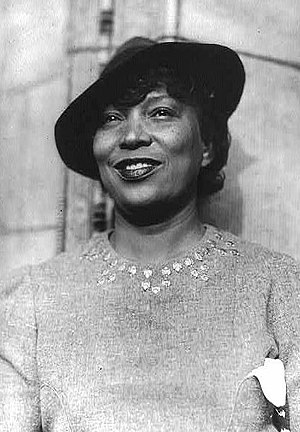Zora Neale Hurston: Difference between revisions
(Created page with "{{subpages}} {{Image|Hurston-Zora-Neale-LOC.jpg|right|300px|A black-and-white photo of Zora Neale Hurston}} '''Zora Neale Hurston''' (1891-1960) was an author, playwright, and anthropologist who focused her studies and work on Black culture. For her anthropological studies, Hurston travelled through the United States to learn about Black folklore, and to Haiti and Jamaica to study the African Diaspora.<ref name=Biography /> She is considered to be part of the Harl...") |
(Improved sources) |
||
| (One intermediate revision by one other user not shown) | |||
| Line 1: | Line 1: | ||
{{subpages}} | {{subpages}} | ||
{{Image|Hurston-Zora-Neale-LOC.jpg|right|300px|A black-and-white photo of Zora Neale Hurston}} | {{Image|Hurston-Zora-Neale-LOC.jpg|right|300px|A black-and-white photo of Zora Neale Hurston}} | ||
'''Zora Neale Hurston''' (1891-1960) was an author, playwright, and anthropologist who focused her studies and work on Black culture. For her anthropological studies, Hurston | '''Zora Neale Hurston''' (1891-1960) was an author, playwright, and anthropologist who focused her studies and work on Black culture. For her anthropological studies, Hurston traveled through the United States to learn about Black folklore, and to Haiti and Jamaica to study the [[African Diaspora]].<ref name=Biography /> She is considered to be part of the Harlem Renaissance<ref name=HarRen />, and she often collaborated with other famous writers of the renaissance, such as [[Langston Hughes]]. Some of her most popular books include ''Their Eyes Were Watching God'', a novel about a woman living in the South, ''Mules and Men'', a collection of African American folklore, and ''Dust Tracks on a Road'', her autobiography. Despite the success of her books, she was underpaid for them, which left her penniless. | ||
When Hurston died a year after having a stroke, she was buried in an unmarked grave. Author [[Alice Walker]] searched for and located Hurston's grave in 1973, and marked it with a simple grave marker. Walker published an article entitled “In Search of Zora Neale Hurston,” which led to a revival of Hurston's popularity.<ref name=Timeline /> | When Hurston died a year after having a stroke, she was buried in an unmarked grave. Author [[Alice Walker]] searched for and located Hurston's grave in 1973, and marked it with a simple grave marker. Walker published an article entitled “In Search of Zora Neale Hurston,” which led to a revival of Hurston's popularity.<ref name=Timeline /> | ||
| Line 7: | Line 7: | ||
==References== | ==References== | ||
<references> | <references> | ||
<ref name=Timeline> | <ref name=Timeline> | ||
[https://www.zoranealehurston.com/about/ | [https://www.zoranealehurston.com/about/ About Zora Neale Hurston] by Valerie Boyd on Hurston's official website </ref> | ||
<ref name=Biography> | <ref name=Biography> | ||
[https://www.womenshistory.org/education-resources/biographies/zora-hurston] | [https://www.womenshistory.org/education-resources/biographies/zora-hurston Zora Neale Hurston] by Arlisha R. Norwood at the National Women's History Museum, 2017 | ||
</ref> | </ref> | ||
<ref name=HarRen> | |||
Wikipedia has [[Wikipedia:Harlem Renaissance|an extensive article]] about the Harlem Renaissance. | |||
</ref> | |||
</references> | </references> | ||
Latest revision as of 10:15, 25 January 2024
Zora Neale Hurston (1891-1960) was an author, playwright, and anthropologist who focused her studies and work on Black culture. For her anthropological studies, Hurston traveled through the United States to learn about Black folklore, and to Haiti and Jamaica to study the African Diaspora.[1] She is considered to be part of the Harlem Renaissance[2], and she often collaborated with other famous writers of the renaissance, such as Langston Hughes. Some of her most popular books include Their Eyes Were Watching God, a novel about a woman living in the South, Mules and Men, a collection of African American folklore, and Dust Tracks on a Road, her autobiography. Despite the success of her books, she was underpaid for them, which left her penniless.
When Hurston died a year after having a stroke, she was buried in an unmarked grave. Author Alice Walker searched for and located Hurston's grave in 1973, and marked it with a simple grave marker. Walker published an article entitled “In Search of Zora Neale Hurston,” which led to a revival of Hurston's popularity.[3]
References
- ↑ Zora Neale Hurston by Arlisha R. Norwood at the National Women's History Museum, 2017
- ↑ Wikipedia has an extensive article about the Harlem Renaissance.
- ↑ About Zora Neale Hurston by Valerie Boyd on Hurston's official website
